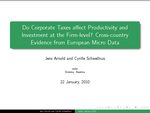Do Corporate Taxes affect Productivity and Investment at the Firm-level? Cross-country Evidence from European Micro Data

Jens Arnold and Cyrille Schwellnus
Cyrille Schwellnus, OECD
(with Jens Arnold)
This paper uses a stratified sample of firms across Western Europe over the period 1996-2004 to test for the existence of a link between corporate taxation and productivity. Corporate taxes may reduce incentives for productivity-enhancing innovations by reducing their post-tax returns, and may reduce incentives for risk taking by firms. In addition, corporate taxes can increase the user cost of capital and reduce incentives to invest in physical capital, which may affect productivity through technological progress embodied in new physical capital. Applying a differences-in-differences estimation strategy that assumes differential effects of corporate taxes across firms with different profitability, we find that corporate taxes reduce productivity at the firm level. The effect is negative across firms of different size and age classes except for the small and young, which may be attributable to the relatively low profitability of small and young firms. The negative effect of corporate taxes is particularly pronounced for firms that are catching up with the technological frontier.
(with Jens Arnold)
This paper uses a stratified sample of firms across Western Europe over the period 1996-2004 to test for the existence of a link between corporate taxation and productivity. Corporate taxes may reduce incentives for productivity-enhancing innovations by reducing their post-tax returns, and may reduce incentives for risk taking by firms. In addition, corporate taxes can increase the user cost of capital and reduce incentives to invest in physical capital, which may affect productivity through technological progress embodied in new physical capital. Applying a differences-in-differences estimation strategy that assumes differential effects of corporate taxes across firms with different profitability, we find that corporate taxes reduce productivity at the firm level. The effect is negative across firms of different size and age classes except for the small and young, which may be attributable to the relatively low profitability of small and young firms. The negative effect of corporate taxes is particularly pronounced for firms that are catching up with the technological frontier.
Keywords: productivity, growth, tax structure, firm level data, fiscal policy
JEL classification: D21, D24, E22, E62, H25, H32
Countries covered: European Union
Research Areas: Macroeconomic Analysis and Policy